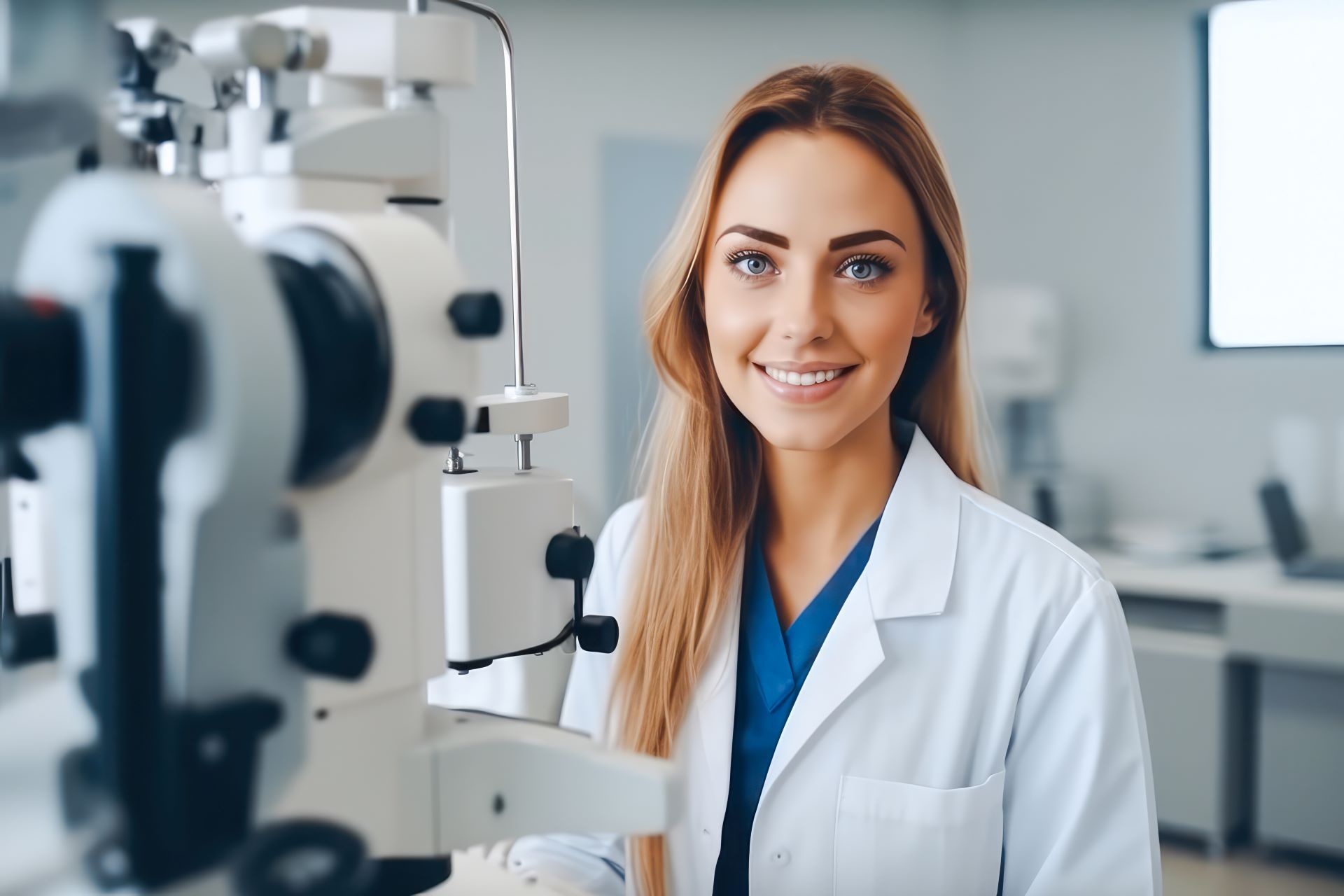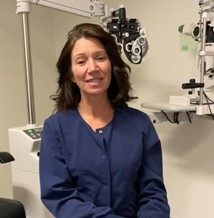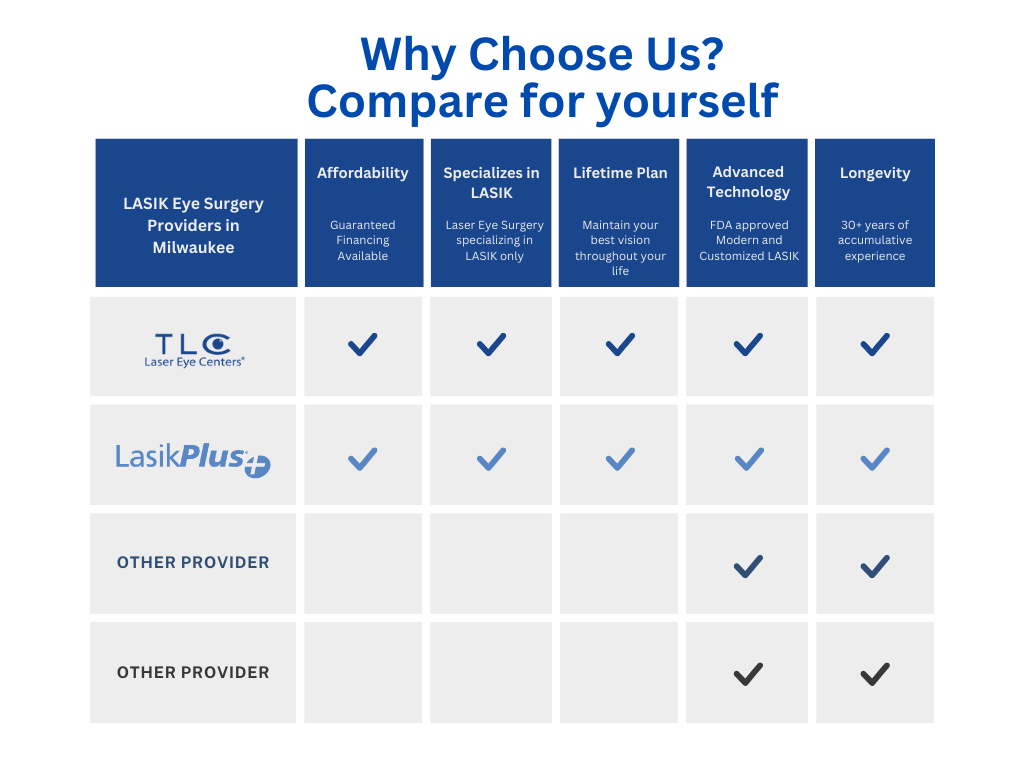Milwaukee Laser Eye Surgery Center
LASIK Surgeon, Dr. Louis Probst, One of the Most Experienced LASIK Eye Surgeons in the Nation!
You only have one set of eyes, so why not trust them to one of the most experienced LASIK surgeons in the country. With over 110,000 LASIK procedures under his belt, Dr. Louis Probst and our entire staff at TLC’s Milwaukee Laser Eye Surgery Center has no shortage of experience. The TLC Milwaukee LASIK Center sets the Gold Standard for outstanding patient experiences and outcomes. We are eager to start you on your path to better vision.
As National Medical Director of TLC Laser Eye Centers, Dr. Louis Probst trains surgeons, lectures internationally and has authored five books and and over 80 book chapters on LASIK. He has performed more than 110,000 LASIK procedures to date, including over 400 procedures on fellow eye doctors.
Locally, our Brookfield center has been providing modern LASIK for Milwaukee, East Side, Bayside, Riverwest, Bay View, Walker’s Point, Historic Third Ward, and many other areas, since 2014, making it one of the longest running vision centers in the area. Our longevity is a testament to our talented medical team and their experience, great outcomes, but most importantly, a first-class experience for our patients.
No more glasses! Watch a patient experience the amazing results of LASIK surgery with Dr. Probst. She’s been wearing glasses since childhood.
Working alongside Dr. Probst in your Optometrist, Dr. Renee Haefs. Under her expertise and direction of your clinical team, your candidacy for laser vision correction will be carefully reviewed.
Benefits of LASIK in Milwaukee, WI:

- Improved Vision: LASIK can significantly improve your vision, allowing you to see clearly without the need for glasses or contact lenses. Many patients experience 20/20 vision or better after LASIK, enhancing their quality of life and overall visual experience.
- Convenience and Freedom: Say goodbye to the hassles of glasses and contact lenses. With LASIK, you can enjoy the freedom of clear vision throughout the day, whether it’s for work, sports, or leisure activities. No more worrying about misplaced glasses or discomfort from contact lenses.
- Enhanced Performance: LASIK can improve your performance in various activities. Athletes, in particular, benefit from the improved visual acuity and reduced dependency on corrective eyewear. Whether you’re playing sports or engaging in outdoor activities, LASIK can give you a competitive edge.
- Cost Savings: Over time, the cost of glasses, contact lenses, and associated maintenance can add up. LASIK offers a long-term cost-saving advantage as it eliminates or reduces the need for these expenses. While the upfront cost of LASIK may seem significant, it can be a worthwhile investment in the long run.
- Quick Recovery: LASIK offers a relatively quick recovery time compared to other surgical procedures. Most patients experience improved vision within 24 to 48 hours after the surgery. You can resume your daily activities with minimal downtime, enjoying the benefits of clear vision sooner.
Take $1000* OFF LASIK
claim your offer today!Meet Your TLC LASIK Eye Surgery Milwaukee, WI Team
-

Dr. Louis Probst
LASIK Surgeon -

Dr. Renee Haefs, O.D.
Clinical Optometrist
Considering LASIK surgery? We make it simple.
-
- Easy Booking Process: We understand that your time is valuable. That’s why we’ve streamlined our booking process to make it as simple as possible for you to schedule your free LASIK consultation. With just a few clicks or a quick call, you can take the first step towards clearer vision.
- Patient-Centric Care: At TLC Laser Eye Surgery Center, you’re more than just a patient – you’re a valued member of our vision correction family. Our friendly and knowledgeable staff will guide you through every step of the LASIK journey, from your initial consultation to post-operative care, ensuring you feel informed and supported along the way.
- Rave Reviews: Don’t just take our word for it – hear what our patients have to say about their LASIK experiences with us. With over 110,000 LASIK procedures performed by Dr. Louis Probst and our team, we’ve earned a reputation for excellence and outstanding outcomes. Read our patient testimonials to see why TLC Madison is the premier choice for LASIK in Wisconsin.
Why choose TLC Laser Eye Surgery Center in Milwaukee, WI?
When it comes to LASIK eye surgery in Milwaukee, WI, TLC Laser Eye Surgery Center is the premier choice for exceptional vision correction. Here’s why you should choose us:
Experienced LASIK Surgeons: Our highly skilled LASIK surgeons in Milwaukee have extensive experience and a proven track record of delivering outstanding results. With their expertise and precision, you can trust that your vision is in capable hands.
State-of-the-Art Facility: Our Milwaukee center is equipped with the latest technology and advanced surgical equipment, ensuring optimal results and a safe procedure. We prioritize your comfort and safety throughout your LASIK journey.
Personalized Patient Care: At TLC Laser Eye Surgery Center, we believe in providing individualized care to each patient. Our friendly and knowledgeable staff will address all your concerns and guide you through the LASIK process, ensuring that you feel comfortable and well-informed at every step.
Exceptional Outcomes: We are committed to delivering excellent outcomes and helping you achieve clear, crisp vision. Our focus on quality care, combined with advanced technology, ensures that you receive the best possible results from your LASIK surgery.

Cost of LASIK Surgery in Milwaukee, WI:
The cost of LASIK surgery in Milwaukee, WI can vary depending on several factors, including the specific procedure, the technology used, and the individual needs of the patient. To get an accurate estimate of the cost, we recommend scheduling a consultation at TLC Laser Eye Surgery Center. Our friendly staff can provide you with a personalized evaluation and discuss the associated costs. We also offer affordable financing options to help make LASIK more accessible for our patients.
When comparing LASIK costs, consider the doctor’s experience and technology used, as cheaper prices could mean less expertise and outdated lasers. Low initial quotes may not include comprehensive evaluations, follow-ups, and extra services like bladeless LASIK or Wavefront mapping. While tempting, an unusually low LASIK price could indicate cut corners. Focus on quality over cost when researching your LASIK provider.
Does Insurance cover LASIK in Milwaukee, WI?:
While most insurance plans do not typically cover LASIK as it is considered an elective procedure, it’s advisable to check with your insurance provider to understand their specific coverage policies. At TLC Laser Eye Surgery Center, we strive to make LASIK affordable and accessible. We offer various financing programs that can help you manage the cost of the procedure. Our team will work closely with you to explore the best financial options available.
How HSAs and FSAs Can Help You Afford LASIK
Ready to ditch the glasses and contacts? Laser vision correction can give you the freedom you crave. But the cost can be a hurdle. Here’s some good news: you might be able to save significantly by using your Flexible Spending Account (FSA) or Health Savings Account (HSA).
FSAs and HSAs let you contribute pre-tax dollars to cover eligible medical expenses, including laser vision correction procedures like LASIK and PRK. This translates to real savings – up to 20%-30% off the total cost!
Laser vision correction is an investment in your future. HSAs and FSAs can make it more affordable. Don’t wait – ditch the glasses and contacts and see the world clearly with the help of your FSA or HSA!
Follow TLC Laser Eye Centers On Instagram
View this profile on Instagram
What is LASIK?
LASIK, or Laser-Assisted In Situ Keratomileusis, is a revolutionary vision correction procedure that has helped millions of people achieve clearer vision without glasses or contact lenses.
How LASIK Works
LASIK is a non-invasive procedure that reshapes the cornea, the clear front part of your eye. This reshaping corrects refractive errors like:
- Myopia (nearsightedness)
- Hyperopia (farsightedness)
- Astigmatism
The procedure involves:
- Numbing the eye: Anesthetic eye drops are used to ensure comfort.
- Creating a corneal flap: A thin flap is created on the cornea using a laser.
- Reshaping the cornea: A laser is used to reshape the underlying corneal tissue.
- Replacing the flap: The flap is gently repositioned, healing naturally.
Types of LASIK
- Bladeless LASIK: Uses a laser to create the corneal flap, eliminating the need for a blade.
- Custom LASIK: Tailors the procedure to your individual eye shape and vision needs using Wavefront Technology.
- Topography-Guided LASIK: Uses advanced technology to create a more precise correction.
Benefits of LASIK
- Improved vision: Can significantly reduce or eliminate dependence on glasses or contacts.
- Convenience: No more fumbling with glasses or contact lenses.
- Enhanced quality of life: Enjoy greater freedom and clarity in daily activities.
Does LASIK hurt?
Thanks to advancements in technology and techniques, LASIK is designed to be a highly comfortable procedure. Here’s a breakdown:
- Anesthesia: Numbing eye drops are administered to ensure you feel no pain during the procedure.
- Corneal Flap Creation: While you might feel a slight pressure during this step, it’s typically not painful.
- Laser Reshaping: The laser itself is cool and precise, causing no discomfort.
- Flap Replacement: This step is also generally painless.
Post-Operative Discomfort
While the procedure itself is typically painless, you might experience some mild discomfort afterward, similar to having a small object in your eye. This is often temporary and can be managed with over-the-counter eye drops or ointments.
Minimizing Discomfort
To minimize any discomfort, follow your surgeon’s instructions carefully, which may include:
- Pre-operative medications: Taking prescribed anti-inflammatory or anti-anxiety medications.
- Proper eye care: Using prescribed eye drops and ointments.
- Resting and avoiding stress: Allowing your eyes to heal and avoiding strenuous activities.
Consulting with a LASIK Professional
At TLC Laser Eye Centers, our experienced LASIK surgeons are dedicated to providing a comfortable and effective procedure. We’ll discuss any concerns you have and ensure you’re well-prepared for the process.
Individual Experiences May Vary
While most patients experience minimal discomfort, it’s important to note that individual experiences may vary. Factors like pain tolerance and adherence to post-operative care can influence your comfort level.
Who is a candidate for LASIK in Milwaukee, WI?
LASIK is a highly effective vision correction procedure, but not everyone is a suitable candidate. Here are some general criteria for LASIK candidacy in Milwaukee, WI:
- Stable Vision: To be considered for LASIK, your vision prescription should have remained stable for at least one year. Fluctuating vision can affect the accuracy of the procedure’s results.
- Age Requirement: Most LASIK surgeons in Milwaukee, WI recommend that candidates be at least 18 years old. This is because the eyes typically stabilize in their development by this age.
- Good Overall Eye Health: Candidates should have healthy eyes, free from any conditions such as glaucoma, cataracts, or severe dry eye syndrome. Additionally, certain corneal conditions or diseases may impact candidacy, which can be evaluated during a comprehensive eye examination.
- Realistic Expectations: Candidates should have realistic expectations about the outcomes of LASIK. While the procedure can significantly reduce dependence on glasses or contact lenses, it may not guarantee perfect vision or eliminate the need for reading glasses as you age.
It’s important to note that determining candidacy for LASIK requires a thorough evaluation by an experienced LASIK surgeon in Milwaukee, WI. They will assess your individual eye health and vision needs to determine if LASIK is the right option for you.
How long is LASIK recovery in Milwaukee, WI?
LASIK offers a relatively quick recovery time compared to other surgical procedures. While individual experiences may vary, here is a general timeline of what to expect during LASIK recovery in Milwaukee, WI:
- Immediate Post-Operative Period: After the LASIK procedure, you may experience some mild discomfort, such as a gritty sensation or slight burning. Your eyes may be sensitive to light, and your vision may be temporarily blurry or hazy immediately after the surgery. These effects are normal and should subside within a few hours.
- First 24 to 48 Hours: In the first day or two following LASIK, you will likely notice improvements in your vision. However, it’s common to experience some fluctuation and mild visual disturbances during this time. It’s important to follow the post-operative instructions provided by your Milwaukee, WI LASIK surgeon, which may include using prescribed eye drops and avoiding activities that can strain your eyes.
- Initial Weeks: Over the course of the first few weeks, your vision will continue to stabilize. You may have scheduled follow-up visits with your LASIK surgeon in Milwaukee, WI to monitor your progress and ensure proper healing. During this period, it’s important to avoid rubbing your eyes and to protect them from irritants such as dust or chemicals.
- Long-Term Recovery: While you will likely experience significant visual improvement within the first few weeks, it’s important to note that your eyes will continue to heal and adjust over several months. Most patients in Milwaukee, WI achieve their final visual acuity within three to six months after LASIK.
During the recovery period, it’s crucial to attend all post-operative appointments with your Milwaukee, WI LASIK surgeon and follow their instructions diligently. If you have any concerns or questions about your recovery, don’t hesitate to reach out to them.
Remember that these are general guidelines, and individual experiences may vary. Your LASIK surgeon in Milwaukee, WI will provide you with specific instructions and guidance tailored to your unique circumstances to ensure a smooth and successful recovery.
Understanding Common Vision Problems: Myopia, Hyperopia, and Astigmatism
Over 70 million people in North America, about one in four, have myopia (nearsightedness). Myopia causes blurred distant vision, with severity determining how clear distant objects appear. Highly myopic people likely have thick glasses. We will explore common vision conditions – myopia, hyperopia (farsightedness), and astigmatism – that cause blurred vision.
Normal Vision
Normal vision depends on light rays precisely converging on the retina. The eye’s cornea, lens, and vitreous body refract (bend) light at the right angles for sharp image projection onto the retina. This total refraction measures in diopters. Zero diopters represents flawless focusing with no image distortion.
Myopia (Nearsightedness)
Myopia typically results from an elongated eyeball, prematurely converging light rays in front of the retina. This blurred distant vision severity relates to when objects appear clear – severe myopia limits this to a few inches while milder cases can see clearly for yards. Corrective lenses reduce overall eye refractive power, shifting the focal point back onto the retina.
Hyperopia (Farsightedness)
Hyperopia arises from a shortened eyeball, delaying light ray convergence behind the retina, blurring near vision first. Distance clarity remains thanks to lens compensation. However, eye strain and headaches commonly occur from constant focusing efforts. Most cope until around 40 years old when presbyopia limits lens flexibility. Some cannot overcome severe hyperopia without vision correction. Treatment increases overall eye refractive power, moving the focal point onto the retina.
Astigmatism
Astigmatism occurs when the typically spherical cornea has an irregular “egg” shape. Consequently, multiple focal points within the eye lead to uneven, distorted bending of incoming light. This results in image tilting regardless of object distance. Many myopic and hyperopic patients also exhibit astigmatism to some degree. Marked astigmatism substantially degrades all vision.
Conclusion
Myopia, hyperopia, and astigmatism comprise common vision abnormalities causing blurred sight. Each stems from optical refraction issues that can often improve with corrective surgery. Understanding these conditions aids in preserving eye health and visual acuity.
TLC Partners With Your Milwaukee, WI Eye Doctor:
At TLC Laser Eye Surgery Center in Milwaukee, WI, we believe in fostering a collaborative relationship with your trusted local eye doctor. Here’s how our partnership benefits you:
- Coordinated Care: We work closely with your Milwaukee, WI eye doctor to ensure a seamless LASIK experience. From initial consultations to post-operative care, our collaborative approach ensures continuity and optimal results.
- Shared Medical Records: Through our partnership, we facilitate the sharing of important medical records and diagnostic information between our LASIK surgeons and your eye doctor. This allows for a comprehensive understanding of your eye health history, enabling informed decision-making and personalized care.
- Ongoing Relationship: After your LASIK procedure, your Milwaukee, WI eye doctor will continue to be your primary eye care provider. They will monitor your eye health, conduct regular check-ups, and address any concerns or questions you may have. This ongoing relationship ensures consistent and comprehensive care.
- Enhanced Communication: Our partnership fosters effective communication channels between our LASIK center and your eye doctor. We believe that collaborative communication leads to better patient outcomes. By working together, we can optimize your LASIK results and provide a seamless experience.
By choosing TLC Laser Eye Surgery Center in Milwaukee, WI, you benefit from our collaborative approach with your trusted eye doctor. This partnership ensures that you receive the highest standard of care before, during, and after your LASIK procedure.
Contact us today to schedule a FREE consultation and discover how our partnership with your eye doctor can provide you with exceptional LASIK care and help you achieve clear, glasses-free vision.
